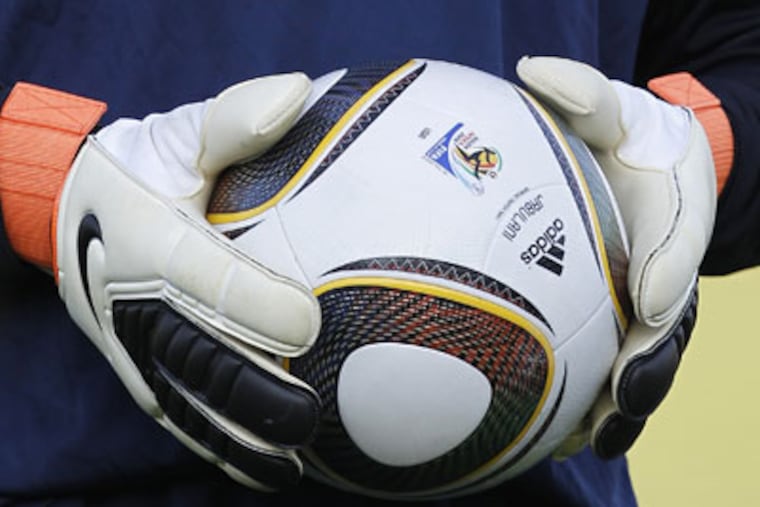Lively ball livens up Cup talk
JOHANNESBURG, South Africa - Goalkeepers seem to enjoy a new soccer ball about as much as they enjoy defending a penalty kick.

JOHANNESBURG, South Africa - Goalkeepers seem to enjoy a new soccer ball about as much as they enjoy defending a penalty kick.
A new ball is always too light, too unpredictable, the wrong color, and what was the problem with the old one, anyway?
This summer's latest edition - the Jabulani, created by Adidas for the 2010 FIFA World Cup - has recently been called all sorts of bad names by the stars preparing to use it.
The most contemptuous review came from Brazilian goalkeeper Julio Cesar, who told the press: "It's terrible, horrible. It's like one of those balls you buy in the supermarket."
The Jabulani, tabbed the "roundest" ball ever produced, has only eight panels and was engineered for aerodynamics, flight stability and perfect grip under all conditions.
At the 2006 FIFA World Cup, held in Germany, the goals-per-match number dipped to an anemic 2.30, a number that some folks are determined to remedy.
Essentially, the Jabulani was designed to find the back of the net, a result that often produces a frustrated goalie.
Marcus Hahnemann, backup keeper for the U.S. national team, is no different.
On Thursday afternoon, a few hours before the U.S. team's training session, Hahnemann was part of a news conference panel that included coach Bob Bradley and forward Clint Dempsey.
The U.S. team plays Australia in its final exhibition match on Saturday afternoon. The game takes place in Roodepoort, about 25 miles south of the team's home base between Johannesburg and Pretoria.
The U.S. team opens World Cup play against England on June 12.
But on Thursday, the liveliest discussion centered on everyone's attention: the ball.
"Balls are supposed to bend, and balls are supposed to knuckle," explained Hahnemann. "This ball, you have no idea what's going to happen with it. . . . It's a nightmare for us. It not only moves for us, but for guys attacking the ball on crosses. The idea is to score more goals, so people can shoot from 40 yards and have a chance of it going in. But to me, that's not good soccer."
Bradley wouldn't agree with Hahnemann, but pointed to the altitude - Johannesburg's elevation is 5,570 feet - as a potential game-changer.
Dempsey also steered wide of the keeper's frustration.
"Me, personally, I like the ball because if you hit it just right, you don't even have to hit it as hard as you can," Dempsey said. "If you just hit it solid, you can cause problems for the goalie. . . . If you get it just a little bit wrong, you can end up looking pretty silly."
After Dempsey finished speaking, Hahnemann leaned forward and offered his final thought on the subject: "Technology is not everything. Scientists came up with the atom bomb. Doesn't mean we should have invented it."
Still evaluating. Bradley said the team would use Saturday's exhibition match to further evaluate a potential starting lineup against England, saying he's "not sure yet" who he'll start on June 12.
Bradley mentioned that defender Oguchi Onyewu, still finding his form after a knee injury, would see a significant amount of minutes against Australia.